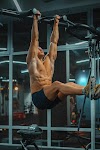If you're looking for an exercise for lower chest, you have come to the right place. This article will discuss Chest dips, Cable crossover, Decline bench press, and Incline push ups. You can also do them at home with the help of exercise bands. To get the best results, it's important to hold your pelvis neutral while performing each exercise. Your goal is to create a long, smooth line.
Cable crossover
The
cable crossover exercise is one of the most popular lower chest exercises. It
adds variety to your routine and is a great way to work different parts of your
chest. Start by lying on the cable crossover machine with your hands slightly
bent. Next, extend your arms at about mid-thigh height. As you move your arms,
pivot from your shoulders and bring the cables together to your mid-chest.
The
cable crossover is an exercise that targets the chest and also engages the
shoulders and back. It is a great exercise for beginners because it hits the
chest from a different angle, which allows you to focus on a different set of
muscle fibers. Unlike some chest exercises, it is also easier on the tendons
and joints.
Chest dip
A
chest dip exercise is an effective way to build your lower chest muscles. The
dip involves tilting the body forward and placing your weight on your arms,
shoulders, and elbows Once the dip begins, push through the elbows until the
body reaches ninety degrees, and then repeat. The dip exercise is easy to
learn, but it's important to master proper form and positioning.
The
dip is usually performed with two handles. While performing a dip, keep your
shoulders and core tight, and breathe out. Then bend your knees, allowing your
feet to rise slightly off the ground. Then, slowly lower your body back to the
floor. At the bottom, your upper arms should be parallel with the floor. Repeat
this sequence until the dip reaches your desired depth. Do not lock your
elbows, though.
Decline bench press
The
decline bench press is one of the most effective exercises for the lower chest.
Although almost all chest exercises target the upper and middle chest, this
exercise focuses on the lower pecs. When performing this exercise, you should
choose a weight that feels moderately difficult, but not too heavy that you
endanger your form. Once you have a comfortable weight, you can begin your
lower chest workout.
The
decline bench press should be performed with a closed grip. body weight exercies for shoulder is also A closed grip is
one that encircles the bar and is slightly wider than shoulder width apart.
This grip increases safety and reduces the chance of the bar slipping. It
should be performed with a controlled motion.
Incline push up
An
incline push up is an upper body exercise that works the chest, shoulders, and
triceps. It places more emphasis on the lower chest than on the shoulders, and
it can help build lower chest strength. Incline pushups can be performed by
people of any fitness level, although some precautions should be taken to
prevent injuries.
The
Incline Push Up is one of the easiest Push Up variations, and it targets the
lower chest muscles. However, it can be modified in a number of ways. You can
increase the incline by placing your hands on a wall, or you can lower the hand
placements to a point that allows you to use more of your shoulders.
Seated machine fly
To
start, brace your core and lean forward. Next, bring your arms in front of your
chest while simultaneously drawing a wide arc out from the shoulder joint. Keep
your arms extended, and your elbows should be slightly bent. Hold the stretch
for several seconds before moving to the next part of the exercise.
A
seated machine fly works the lower chest and shoulders and is also a good
exercise for beginners. It targets the pectoralis major and minor muscle
groups. This exercise is best suited for intermediate level trainees and can be
performed at home. It also benefits people with shoulder injuries.
This
exercise targets the pectorals and oblique muscles in the lower chest. You can
perform seated machine fly exercises without the use of a cable machine by
securing a resistance band to a rack or other stable point. This exercise is
also ideal for finishing a chest day workout.
Also Read-:






.jpg)



0 Comments